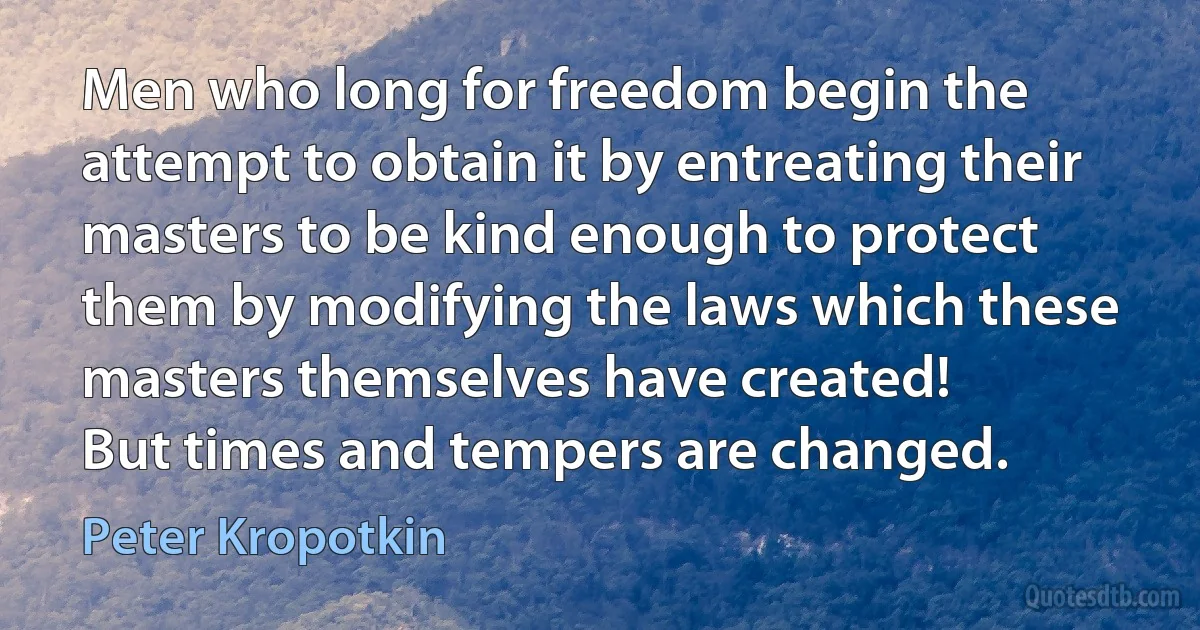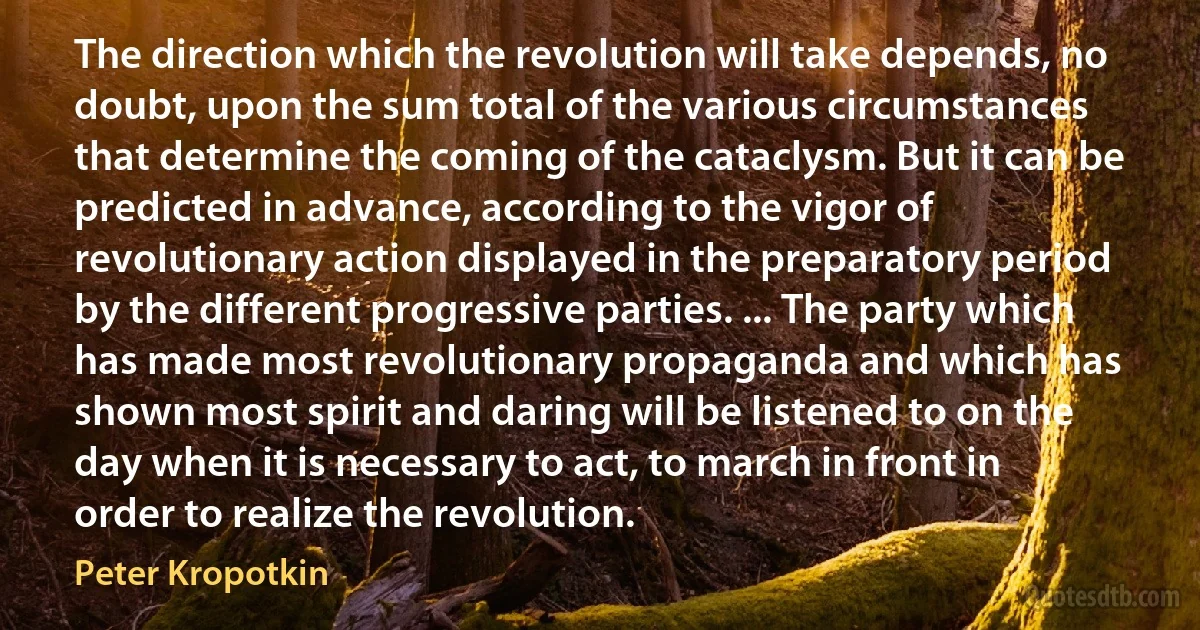Peter Kropotkin quotes - page 6
In the animal world we have seen that the vast majority of species live in societies, and that they find in association the best arms for the struggle for life: understood, of course, in its wide Darwinian sense - not as a struggle for the sheer means of existence, but as a struggle against all natural conditions unfavourable to the species.

Peter Kropotkin
We have not two measures for the virtues of the governed and those of the governors; we know that we ourselves are not without faults and that the best of us would soon be corrupted by the exercise of power. We take men for what they are worth - and that is why we hate the government of man by man, and that we work with all our might - perhaps not strong enough - to put an end to it.

Peter Kropotkin
Unless Socialists are prepared openly and avowedly to profess that the satisfaction of the needs of each individual must be their very first aim; unless they have prepared public opinion to establish itself firmly at this standpoint, the people in their next attempt to free themselves will once more suffer a defeat.

Peter Kropotkin
The millions of laws which exist for the regulation of humanity appear upon investigation to be divided into three principal categories: protection of property, protection of persons, protection of government. And by analyzing each of these three categories, we arrive at the same logical and necessary conclusion: the uselessness and hurtfulness of law.

Peter Kropotkin
The whole aspect of the universe changes with this new conception. The idea of force governing the world, of pre-established law, preconceived harmony, disappears to make room for the harmony that Fourier had caught a glimpse of: the one which results from the disorderly and incoherent movements of numberless hosts of matter, each of which goes its own way and all of which hold each other in equilibrium.

Peter Kropotkin
The history of human thought recalls the swinging of a pendulum which takes centuries to swing. After a long period of slumber comes a moment of awakening. Then thought frees herself from the chains with which those interested - rulers, lawyers, clerics - have carefully enwound her.
She shatters the chains. She subjects to severe criticism all that has been taught her, and lays bare the emptiness of the religious political, legal, and social prejudices amid which she has vegetated. She starts research in new paths, enriches our knowledge with new discoveries, creates new sciences.
But the inveterate enemies of thought - the government, the lawgiver, and the priest - soon recover from their defeat. By degrees they gather together their scattered forces, and remodel their faith and their code of laws to adapt them to the new needs.

Peter Kropotkin
If you reason instead of repeating what is taught you; if you analyze the law and strip off those cloudy fictions with which it has been draped in order to conceal its real origin, which is the right of the stronger, and its substance, which has ever been the consecration of all the tyrannies handed down to mankind through its long and bloody history; when you have comprehended this, your contempt for the law will be profound indeed. You will understand that to remain the servant of the written law is to place yourself every day in opposition to the law of conscience, and to make a bargain on the wrong side; and, since this struggle cannot go on forever, you will either silence your conscience and become a scoundrel, or you will break with tradition, and you will work with us for the utter destruction of all this injustice, economic, social and political.

Peter Kropotkin
When a revolutionary situation arises in a country, before the spirit of revolt is sufficiently awakened in the masses to express itself in violent demonstrations in the streets or by rebellions and uprisings, it is through action that minorities succeed in awakening that feeling of independence and that spirit of audacity without which no revolution can come to a head.
Men of courage, not satisfied with words, but ever searching for the means to transform them into action, - men of integrity for whom the act is one with the idea, for whom prison, exile, and death are preferable to a life contrary to their principles, - intrepid souls who know that it is necessary to dare in order to succeed, - these are the lonely sentinels who enter the battle long before the masses are sufficiently roused to raise openly the banner of insurrection and to march, arms in hand, to the conquest of their rights.

Peter Kropotkin
Harmony thus appears as a temporary adjustment, established among all forces acting upon a given spot - a provisory adaptation; and that adjustment will only last under one condition: that of being continually modified; of representing every moment the resultant of all conflicting actions. Let but one of those forces be hampered in its action for some time and harmony disappears. Force will accumulate its effect; it must come to light, it must exercise its action, and if other forces hinder its manifestation it will not be annihilated by that, but will end by upsetting the present adjustment, by destroying harmony, in order to find a new form of equilibrium and to work to form a new adaptation. Such is the eruption of a volcano, whose imprisoned force ends by breaking the petrified lavas which hindered them to pour forth the gases, the molten lavas, and the incandescent ashes. Such, also, are the revolutions of mankind.

Peter Kropotkin
The uncertainty of Socialists themselves concerning the organization of the society they are wishing for, paralyses their energy up to a certain point.
At the beginning, in the forties, Socialism presented itself as Communism, as a republic one and indivisible, as a governmental and Jacobin dictatorship, in its application to economics. Such was the ideal of that time. Religious and freethinking Socialists were equally ready to submit to any strong government, even an imperial one, if that government would only remodel economic relations to the worker's advantage.
A profound revolution has since been accomplished, especially among Latin and English peoples. Governmental Communism, like theocratic Communism, is repugnant to the worker.

Peter Kropotkin
That we are Utopians is well known. So Utopian are we that we go the length of believing that the Revolution can and ought to assure shelter, food, and clothes to all - an idea extremely displeasing to middle-class citizens, whatever their party color, for they are quite alive to the fact that it is not easy to keep the upper hand of a people whose hunger is satisfied.

Peter Kropotkin



